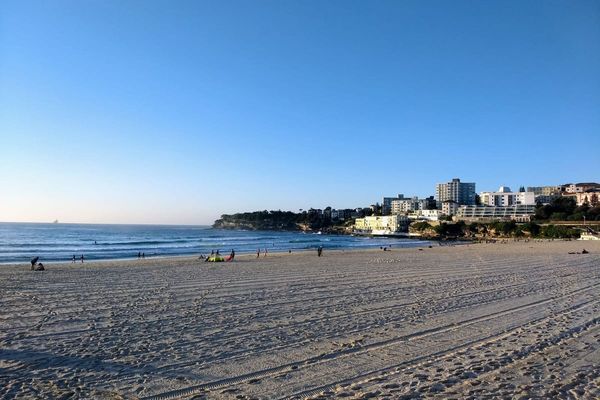
Republican governors from 14 states are sending national guard troops and other personnel to the Texas-Mexico border in a show of force that immigration advocates warn risks lives and critics denounce as “political stunts”.
Florida’s Ron DeSantis has assigned the most – 1,100 people, including 500 national guard and others such as law enforcement officers, a group about 10 times larger than the anti-immigration governor sent in 2021.
Others have promised troops are on the way or will arrive in the next three months from Arkansas, South Dakota, Tennessee, Virginia and elsewhere, with governors using words such as “crisis” or “war zone” and accusing Joe Biden of “failing to repel illegals” in their public announcements.
Their rush answers a call from the Texas governor, Greg Abbott, for reinforcements, citing an emergency, amid his repeated challenges to federal authority at the border. Abbott said that since 2021 “Texas has spent more than $4.5bn on essential border security operations, and the Texas legislature is currently contemplating an additional $4.6bn for the next two years.”
State personnel do not have the power to process people crossing the US-Mexico border to request asylum, which comes under federal authority, and experts caution their presence is confusing, intimidating and potentially dangerous.
“In my experience, speaking with migrants, I think they certainly feel intimidated,” Hanne Sandison, director of the refugee and immigrant program at the Advocates for Human Rights non-profit, said.
She added: “They have really clear and consistent stories across the board of terrifying interactions with some sort of law enforcement at the border. I think it’s not always clear to them who is who.”
The troops commonly stand guard on the US side of long coils of razor wire they have spooled along the banks of the river marking the border, intercepting people and ordering them back across the Rio Grande to Mexico, or to wait for federal border agents to arrive.
Further risks to those turned away include another river crossing, with the Rio Grande just knee-deep in some parts, potentially deadly in many others, or being taken by human smugglers to even more dangerous crossing points.
“Unfortunately, both governors DeSantis and Abbott have used tools of intimidation in many different fashions through the past couple of years and put migrants’ lives at risk in doing so to win political points,” Sandison said.
The Texas military department noted in a statement to the Guardian that the Florida national guard personnel who arrived late last month will be spread roughly from El Paso at the western end of the Texas-Mexico border to Eagle Pass, 500 miles to the south-west and will “augment forces wherever needed”.
“Following orientation, Florida national guard service members will help the Texas national guard and our Texas law enforcement partners continue to prevent, deter and interdict transnational criminal activity between points of entry,” said a spokesman for the department.
Shalyn Fluharty, executive director at Americans for Immigrant Justice, said that in her experience the majority of migrants she had spoken to will cross actively looking for a border patrol agent to whom they may turn themselves in. However, adding other law enforcement personnel and mixing that with out-of-state national guard troops and other law enforcement personnel was bewildering.

“There is a right to seek asylum, regardless of your manner of entry,” Fluharty said. “And what you see over and over are people who are sort of forced to enter that way because there’s no other option and they crossed the river looking for federal immigration officials, not trying to avoid them.”
She added: “I imagine that it is wildly confusing to stumble across other enforcement officials who are there on the border who actually don’t have the authority or, more specifically, the training to receive highly vulnerable populations who, after fleeing persecution and harm, are looking to surrender themselves to law enforcement for protection.”
Other states that have announced plans to send national guard troops to Texas, though in much smaller numbers than Florida, include North Dakota, Idaho, Nebraska, Iowa, West Virginia, Ohio, Oklahoma, South Carolina and Mississippi, with the aim of also intercepting drug smuggling.
During previous deployments of out-of-state troops to Texas, there have been accounts of guard members often having little to do and also suffering from low morale.
One Texas official with experience patrolling the border, who spoke to the Guardian on condition of anonymity, fearing reprimand, said out-of-state national guard members were helpful and a “huge deterrent” to migration, and some enjoy the mission, others don’t.
“A lot of soldiers and troopers complained because they were away from their family for so long. I think one of the problems we’re having right now is more a personal issue among the commissioned personnel around here because their wives are leaving them. The dedication to the job can become overwhelming to our spouses,” the official said, while adding of some visiting troops: “They love what they do and they feel a sense of purpose, these were guys who were working in retail and now they’re here [and] we’re lucky to have them. They become part of the community.”
Abbott’s state border security program, Operation Lone Star, has been highly controversial over issues of treatment of migrants, conditions for troops and the state’s legal authority, with the Department of Justice (DoJ) investigating.
The DoJ declined to comment.
Meanwhile, DeSantis signed anti-immigration legislation into law last month shortly before formally declaring his run for president.
The law criminalizes Floridians who help undocumented immigrants and makes it harder for immigrants to find work, while the governor has caused rows by orchestrating flights to take migrants from Texas to Sacramento, California, and Martha’s Vineyard, Massachusetts, with reported false promises of prearranged jobs and housing.
“These are human beings, they’re not political pawns and we can and should do better as a country,” Sandison said, adding: “Responding in this way is devastating and people will suffer and people will die.”
The offices of the Texas and Florida governors did not provide comment.







